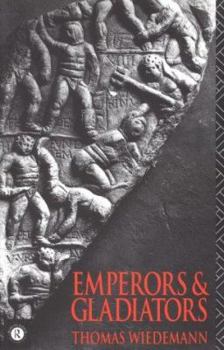Emperors and Gladiators
Select Format
Select Condition 
Book Overview
Wiedemann presents an original and comprehensive study of the changing significance of gladiatoral contests to Roman culture.
Format:Paperback
Language:English
ISBN:0415121647
ISBN13:9780415121644
Release Date:June 1995
Publisher:Routledge
Length:232 Pages
Weight:0.80 lbs.
Dimensions:0.6" x 5.5" x 8.5"
Customer Reviews
4 ratings
Face to face with death
Published by Thriftbooks.com User , 16 years ago
This 1992 book is a scholarly review of the religious, social, cultural, and entertainment values of the Roman Ludi (festivals) and Munera (funeral rites). Thomas Wiederman separates executions from gladiatorial exibitions and explains the legal and cultural significence of each. Christians are certainly thrown to the lions, crucified,and used as human torches but so were many other catagories of 'criminals'. These criminals had no opportunity for self-redemption and ultimate victory. The gladiators, on the other hand, were warring in honor of a recently deceased Roman noble. They were socially beneath contempt, but sometimes adored by their fans (think Dennis Rodman). This book is an intellectual challenge but dispenses with the Hollywood glitz and methodically takes the reader through the mores of ancient Roman times with a cogent explaination of gladiators in purely ancient Roman terms. This book does a wonderful job of avoiding 21st century values in explaining how the 'games' arose and why they persist to this day in the form of bullfights. Hard work, but worth it. Highly recommended. ...
About the social context, not the spectacle
Published by Thriftbooks.com User , 21 years ago
As the author himself states, if you are interested in learning about the different kinds of gladiators or getting a vivid picture of the arena, you would do better to turn to one of the popular surveys such as that by Michael Grant. This book is a study of the role the games played in Roman society -- how they arose, what purpose they served, and why they ultimately disappeared (not, as you might think, because of some new humanitarianism accompanying the rise of Christianity). The author frequently broadens his scope to include the wild-beast shows as well. Much documentary and monumental evidence is discussed. Although scholarly, the book is written in a very readable style and should be of interest to anyone who wants to know more about how the Romans thought.
Roman Games
Published by Thriftbooks.com User , 23 years ago
This book, by author Thomas Wiedemann, is a penetrating look into the processes of the gladiatorial, or spectacle games, of the Roman era. I can agree to some extent with the previous reviewer who stated that this book is difficult for beginners. The only reason I got so much out of it is that I've been reading heavily on spectacles and games. Once you've covered a few of these books, it gets much easier, as most of the same citations and quotes appear in every account. In other words, once you recognize Martial, Tertullian and historians such as Dio and Tacitus, things become much clearer.Wiedemann touches on almost every aspect one can think of in this book. Background information on Republican games is covered well, and the Imperial aspects of the games are also given liberal treatment. Wiedemann discusses the political content of spectacle as well as the decline of the games in the later Roman Empire. Interesting treatments of the role of myth in the games appears here, as does the paradox of the gladiator (Romans considered gladiators the lowest of the low socially, yet idolized them at the same time). Wiedemann sees the gladiators as symbols of Roman virtu, slugging it out in the arena in order to show Romans what it means to be Roman and to teach important lessons on death and rebirth. Wiedemann's discourse on opposition to the games is especially noteworthy. Wiedemann shows that not one aspect of Roman society opposed the games on humanitarian grounds. There was no ACLU in these days. Philosophers opposed the games on the grounds that it brought forth dangerous emotions in man while denying the rational mind. Even Christians didn't make a stink about the dehumanization of the games. They opposed the games because the lessons of rebirth the games taught were an error. Rebirth comes not from receiving mercy from the people and the emperor, but from acceptance of Christ and the sacraments. Actually, the death and destruction the Christians suffered in the arena could be seen as a boon; the huge amount of martyrs created by the games bolstered Christianity by providing important examples of the serenity and power Christ could bring to the faithful.This is a very good book and very helpful to me as I attempt to write a paper on the political role of the games. I do wish Wiedemann could have been a little more organized in his approach. Oftentimes, he seems to be all over the place with his discussions. Some of his claims, while interesting, are somewhat shaky. Wiedemann writes that the placement of the arenas, on the edge of towns and cities, were a symbol of the games themselves, specifically the fight between civilization and nature as best expressed by the animal fights (venatio). I'll buy this civilization vs. nature argument, but not the placement of the arenas. Not all arenas were on the outskirts of towns. Alison Futrell showed that many were tied to local religious sites. In the East, many games were held in pre-existing theaters, whic
An outstanding, well researched book for the serious reader
Published by Thriftbooks.com User , 27 years ago
Meticulously researched with an outstanding, chapter by chapter bibliography, this book should be read by anyone interested in the factual history and cultural significance of gladiatorial contests. Debunks many "Hollywood" misconceptions, such as the myth of the "we who are about to die salute you" salute and the "thumbs down" signal.






